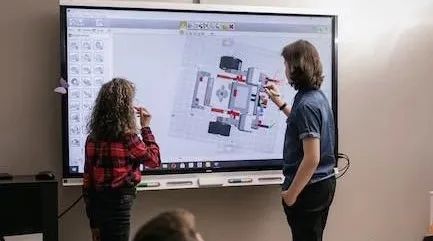
-
执笔新书卷,逐光向远方 ——上海杉达学院2025级财务管理专业CIMA方向班新生见面会温情启幕
-
从“思考帽”到“角色体验”:职场思维进阶记
-
2025丨暑期新加坡深度探索游学之旅~
-
于外教课堂中绽放:杉达学院财务管理CIMA方向班的别样学习时光
-
内卷漩涡中寻光——学长带你解锁留学发展密码



丨全文共3889字,阅读大约需要10分钟
在快速多变的教育领域,德威教学法 视角下的学习是一个包括多个层面,通过三个阶段的学习完成的过程,即 自主学习、小组学习 和 面授课堂 。每个学习阶段都在培育学生对所学知识的深刻与全面的理解过程中为学生的心智成长做出了独特的贡献。
本文将通过对这三个学习阶段的分析,强调提出问题能力在磨练批判性思维能力以及什么条件对培养学生学会深度学习以及培养21世纪能力起到重要作用。

我们通过以下问题概述了培养优秀毕业生的过程思考:
学生的教育诉求是什么?如何指导学生认识他们自身的学习需求,以及在这个过程需要运用哪些特定技能?
学生将在讲师的指导下如何自主阐述他们的学习成果?德威教学法中的自主学习 (SD)、小组学习 (GS) 和课堂面授学习 (FF) 中预期的学习成果是什么?完成三阶段学习需要和培养了哪些技能?
我们提供了哪些系统、工具和人力支持来促进学习?哪些技能是有效利用这些资源所必不可少的?
我们的学生和讲师采用了哪些学习策略?在选择和执行这些策略时,哪些技能是固有的?
如何评估我们学生的学习成果?哪些技能是评估过程的组成部分?

自主学习:释放提问的力量
自主学习是教育自主性的基石,鼓励学生通过提出激发好奇心和促进智力参与的问题,踏上发现之旅。在这个阶段,学生不再是被动接受信息的人,而是积极参与塑造自己学习体验的人。提出高质量问题的能力成为一项重要技能,引导学习者辨别核心概念,发现知识差距,最终掌控自己的学习旅程。

在自主学习中培养提问能力不仅仅是寻求答案,它围绕着教授学生们学会如何整合信息、辨别内容的相关性以及发展批判性思维。通过总结的过程,学生将复杂的想法精炼成简洁、连贯的叙述,磨练他们的沟通技巧并加强他们对内容的理解。这个阶段为学生学会终身学习奠定了基础,使学生在不断变化的学习场景中培养质疑、分析和适应的信心。
从本质上讲,自主学习培养了学生强大的学习能力,使他们能够高效地吸收和理解信息。
适应性是另一个关键技能,学生学会在浏览多种学习材料中根据不断变化的需求来调整他们的学习策略。
在日益数字化的世界中,数字流利性是不可或缺的,自主学习者需要运用科技来查询、评估和综合各种信息。
自主管理能力能够有效的帮助人们设定目标、有效管理时间并在整个学习过程中保持动力。
此外,随着人们更需要通过交流和沟通寻求合作机会,发展人际关系,包括发展自我变得不可或缺。最后,自主学习重视解决问题的能力,鼓励个人批判性地分析挑战,制定有效的解决方案,并不断改进他们解决问题方法。从本质上讲,自主学习全面的培养学生各种能力,培养了自主性和知识追求过程中的韧性。

小组学习:促进合作探究
小组学习标志着从个人探索到集体探究的转变,学生聚集在一起分享他们的见解,并努力把握主题的复杂性。问题在这个阶段扮演着关键角色,作为将合作努力联系在一起并推动小组走向更深理解的粘合剂。在小组环境中,问题不仅作为澄清的工具,而且作为集体探索和批判性思维的催化剂。
在小组学习的背景下,问题是智力交流的货币。学生们带着不同的视角来到课堂,提问过程成为协调这些观点的一种动态手段。通过合作对话,个人挑战假设,表达不确定性,并共同导航材料的复杂性。在这个阶段,提问的艺术超越了个人追求知识的范畴,成为一项共享的事业,每个问题都为群体的集体智慧做出贡献。

沟通是一项核心技能,使参与者能够表达想法,清楚地表达思想,并进行有意义的对话。影响力变得很重要,因为小组成员通过理性论证的力量来说服他人。建立包容性至关重要,创造一个不仅能听到不同声音,而且能积极融入合作过程的环境。
合作是小组学习中的一个固有特征,要求个人协同工作,利用彼此的优势实现共同目标。当小组成员带来不同的见解时,会激发创造性思维,培养一个创新蓬勃的环境。最后,决策能力成为焦点,小组集体评估选项,综合想法,并得出明智的结论。因此,小组学习作为一个动态平台,促进沟通、影响力、包容性、合作、创造性思维和决策能力的发展,从而提升参与者的整体学习体验。

面授课堂学习:指导性探究和知识放大
面对面的学习阶段使学生与讲师直接接触,讲师在塑造学习体验方面发挥着关键作用。在这里,讲师扮演着助教的角色,选择高质量的问题来引发讨论、挑战先入为主的观念并放大关键概念。在这个互动环境中,问题成为讲师用来刺激批判性思维并促进对主题更深理解的战略工具。
面对面学习环境中的讲师充当知识学习的管理者,巧妙地利用问题来阐明关键点并强化关键概念。选择的问题艺术在于如何取得微妙的平衡,确保它不仅能引发智力探究,而且还能作为脚手架,帮助学生驾驭复杂的内容。这个阶段不仅仅是传播知识,而是创造一个互动空间,通过问与答的交流推动学习过程向前发展。

跨学科技能在学生接触一系列学科时成为舞台的中心,它培养学生超越传统边界来综合的理解知识。在跨学科学习中有效的沟通变得至关重要,有效沟通促进学生和讲师之间、同龄人之间的思想和观点的交流与碰撞。
面授课堂学习中应有的学习方式也包括合作学习,它强调团队如何共同探究知识并鼓励学生努力实现共同的学术目标。随着学生无缝地遍历各种数字资源,数字流利性仍然保持其相关性。
除了掌握传统的学术内容外,学生还应该能够熟练地利用技术,例如通过 PowerPoint 等平台创建和交付有影响力的演示文稿。通过互动讨论、作业和项目,可以激发创造性思维,构建培养创新思想蓬勃发展的环境。

此外,面对面的学习要求学生学会及时反馈、适应动态变化的课堂以及不同的教学方法。从本质上讲,面对面的学习培养了一系列丰富的技能,包括跨学科思维、沟通、合作、数字流利性、创造性思维和适应性,为毕业生面对多方面的学术和职业生涯打好基础。
德威教学法三个学习阶段 - 自主学习、小组学习 和 面对面学习 构成了培养学生的综合方法。每个阶段的基础都突出了提出问题的重要性,它在培养好奇心、促进合作探究和引导学习者深刻理解主题方面发挥着关键作用。随着讲师和学生在这些阶段不断进步,提出高质量问题的能力成为一项基石能力,超越学科界限,为个人提供必要的工具,以驾驭我们不断发展的知识领域的复杂性。
以下是一些关于三个学习阶段的总结性思考:
自主学习:强调学生的主动性和责任感,培养他们独立学习和思考的能力。
小组学习:强调合作和协作,培养学生沟通、交流和团队合作的能力。
面对面学习:强调互动和启发,培养学生批判性思维和解决问题的能力。
这三个阶段相互联系,相互促进,共同构成了完整的学习过程。
附:参考英文原版
Journey through the Three Stages of Learning
In the dynamic landscape of education, the journey of learning is a multifaceted process and navigated through our three stages of learning: self-directed learning, group study, and face-to-face interactions. Each stage contributes uniquely to the intellectual development of students, fostering a comprehensive understanding of the subject matter. In this exploration, we delve into the intricacies of these stages, emphasizing the pivotal role of questioning in honing critical thinking skills and nurturing an environment conducive to deep learning.
These questions offer a comprehensive overview of the trajectory toward the educational achievements of CITECH students:
What are the educational requirements of CITECH students? How can guidance be provided to CITECH students in identifying their learning needs, and what specific skills are essential in this process?
How will CITECH students autonomously articulate their learning outcomes, with guidance from the lecturer? What are the anticipated learning outcomes in the CITECH versions of Self-Directed Learning (SD), Group Study (GS), and Face-to-Face learning (FF)? Which skills are integral to this undertaking?
What tools, materials, and human resources has CITECH made available to facilitate learning? Which skills are integral to effectively utilizing these resources?
What learning strategies have our students and lecturers adopted? Which skills are inherent in the selection and execution of these strategies?
How are the learning outcomes of our students assessed? Which skills are integral to the evaluation process?

Self-Directed Learning: Unleashing the Power of Inquiry
Self-directed learning stands as the cornerstone of educational autonomy, encouraging students to embark on a journey of discovery by asking questions that fuel curiosity and promote intellectual engagement. In this stage, students are not merely recipients of information but active participants in shaping their own learning experiences. The ability to formulate quality questions becomes an essential skill, guiding learners to discern the core concepts, identify knowledge gaps, and ultimately take charge of their educational voyage.
The cultivation of question-asking prowess in self-directed learning involves more than just seeking answers. It revolves around teaching students to synthesize information, discern relevance, and develop a critical lens. Through the process of summarization, students distill complex ideas into concise, coherent narratives, honing their communication skills and reinforcing their comprehension of the material. This stage lays the groundwork for a lifelong commitment to learning, instilling in students the confidence to question, analyze, and adapt in an ever-evolving academic landscape.
At its core, self-directed learning grooms a strong learning ability in our students, empowering them to absorb and comprehend information efficiently. Adaptability is another key skill, enabling learners to navigate through diverse learning materials and adapt their strategies based on evolving needs. In an increasingly digitalized world, digital fluency is indispensable, as self-directed learners harness technology to access, evaluate, and synthesize information. Self-management skills come to the forefront as individuals set goals, manage time effectively, and stay motivated throughout the learning process. Moreover, the ability to develop people, including oneself, becomes integral as learners seek collaborative opportunities and peer interactions. Finally, self-directed learning places a premium on problem-solving skills, encouraging individuals to critically analyze challenges, formulate effective solutions, and continuously refine their approach. In essence, self-directed learning cultivates a holistic skill set, fostering autonomy and resilience in the pursuit of knowledge.
 Group Study: Fostering Collaborative Inquiry
Group Study: Fostering Collaborative Inquiry
Group study marks the transition from individual exploration to collective inquiry, as students come together to pool their insights and grapple with the complexities of the subject matter. Questions play a pivotal role in this stage, serving as the glue that binds collaborative efforts and propels the group towards deeper understanding. In a group setting, questions not only serve as tools for clarification but also act as catalysts for collective exploration and critical thinking.
Within the context of group study, questions are the currency of intellectual exchange. Students bring diverse perspectives to the table, and the process of questioning becomes a dynamic means of reconciling these viewpoints. Through collaborative dialogue, individuals challenge assumptions, articulate uncertainties, and collectively navigate through the intricacies of the material. In this stage, the art of asking questions extends beyond the individual's pursuit of knowledge to a shared endeavor where every query contributes to the collective wisdom of the group.
Communication is a cornerstone skill, enabling participants to articulate ideas, express thoughts clearly, and engage in meaningful dialogue. Influence becomes significant as group members share perspectives, persuading others through the power of reasoned argumentation. Building inclusivity is crucial, creating an environment where diverse voices are not only heard but actively integrated into the collaborative process. Collaboration is inherent in group study, requiring individuals to work together cohesively, leveraging each other's strengths to achieve common goals. Creative thinking is stimulated as group members bring diverse insights to the table, fostering an environment where innovation thrives. Finally, decision-making skills come to the forefront as the group collectively evaluates options, synthesizes ideas, and arrives at well-informed conclusions. Group study, therefore, serves as a dynamic platform for the development of communication, influence, inclusivity, collaboration, creative thinking, and decision-making skills, enhancing the overall learning experience for participants.
 Face-to-Face Learning: Guided Inquiry and Knowledge Amplification
Face-to-Face Learning: Guided Inquiry and Knowledge Amplification
The face-to-face learning stage brings students into direct contact with lecturers who play a pivotal role in shaping the learning experience. Here, the lecturer assumes the role of a facilitator, selecting quality questions to prompt discussions, challenge preconceptions, and amplify key concepts. In this interactive setting, questions become a strategic tool wielded by the lecturer to stimulate critical thinking and foster a deeper understanding of the subject matter.
Lecturers in face-to-face learning environments act as curators of knowledge, skillfully utilizing questions to illuminate key points and reinforce critical concepts. The art of selecting questions is a delicate balance, ensuring that it not only prompts intellectual inquiry but also serves as scaffolding to support students in navigating the complexities of the material. This stage is not just about disseminating information; it is about creating an interactive space where the exchange of questions and answers propels the learning process forward.
Transdisciplinary skills take center stage as students encounter a range of disciplines, fostering a comprehensive understanding that transcends traditional boundaries. Effective communication becomes pivotal, not only between students and lecturers but also among peers, facilitating the exchange of ideas and viewpoints. Collaboration is inherent in face-to-face learning, emphasizing the collective pursuit of knowledge and encouraging students to work together towards common academic goals. Digital fluency retains its relevance as students traverse a varied spectrum of digital resources seamlessly integrated into the learning experience. In addition to mastering traditional academic content, students are expected to adeptly utilize technology, such as creating and delivering impactful presentations through platforms like PowerPoint. Creative thinking is stimulated through interactive discussions, assignments, and projects, fostering an environment where innovative ideas can flourish. Additionally, face-to-face learning demands adaptability as students respond to real-time feedback, changing dynamics within the classroom, and diverse teaching methodologies. In essence, face-to-face learning cultivates a rich tapestry of skills, including transdisciplinary thinking, communication, collaboration, digital fluency, creative thinking, and adaptability, preparing students for a multifaceted academic and professional landscape.
Navigating the three stages of learning - self-directed learning, group study, and face-to-face constitutes a comprehensive approach to education. Fundamental to each stage is the central importance of questioning, which plays a crucial role in cultivating curiosity, promoting collaborative inquiry, and steering learners towards a profound comprehension of the subject matter. As lecturers and students progress through these stages, the skill of posing high-quality questions emerges as a cornerstone ability, extending beyond disciplinary confines and arming individuals with the essential tools to navigate the intricacies of our continually evolving realm of knowledge.
(1253 words)
Editor: Paulynn Tan
Layout Designer: Bai Hong Ting
○ 好书推荐 ○
本文源于《德威教学法探索与实践》一书,该书借鉴新加坡办学经验,理论结合实践并通过2016年江苏省教育厅批准的教改项目,与金审学院合作在民办本科学生培养模式与方法上行之有效并取得成绩。如您对本篇内容感兴趣,可以扫描下方二维码(或点开图片长按识别二维码)联系我们留下您的信息,我们的工作人员会通过邮寄的形式将《德威教学法探索与实践》一书送到您那里,欢迎您的阅读。
↓ 扫描二维码
(或点击图片长按识别)


○○○○
○ 往期推荐 ○

>>如果您觉得本篇文章不错,还请转发分享让更多人看到













